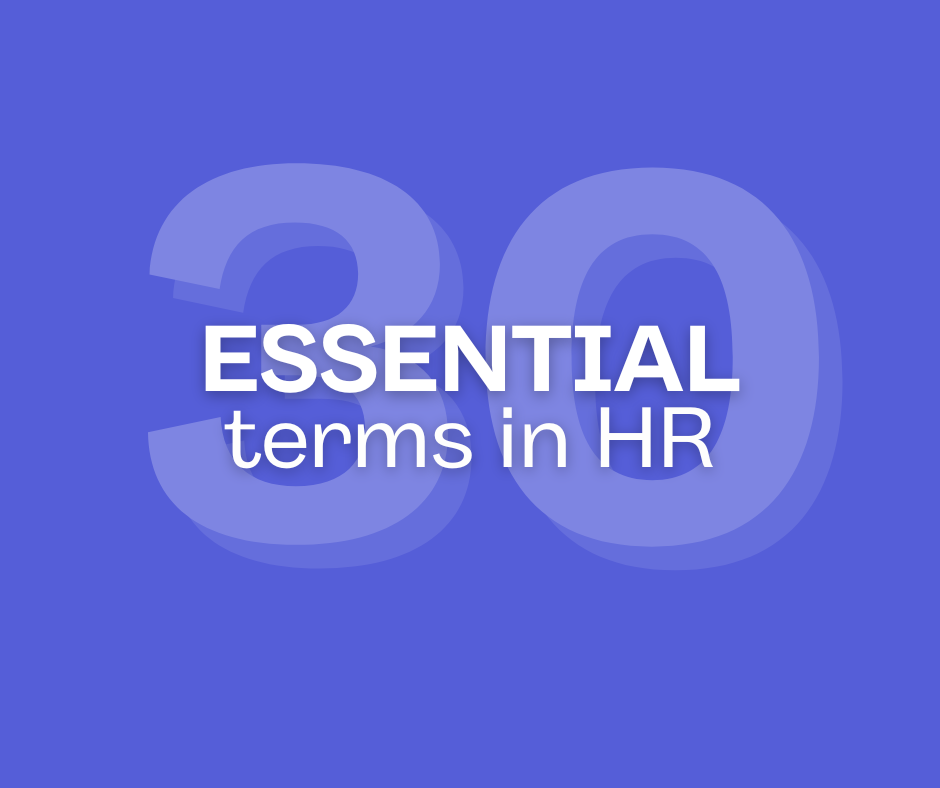
1. Employee absenteeism
When employees are frequently absent from work, which can impact productivity and morale.
2. Applicant Tracking System (ATS)
A digital tool that helps HR teams manage job applications, track candidates, and streamline the hiring process.’
3. Attrition
The natural reduction of staff through resignations, retirements or other reasons that are not firings.
4. Base Salary
The fixed amount of money paid to an employee, not including bonuses, benefits or overtime.
5. Behavioral Interview
A type of interview that asks candidates to describe past experiences to predict future performance.
6. Benefits
Non-wage perks provided by employers, such as health insurance, retirement plans and paid time off.
7. Compensation
The total pay and benefits package offered to an employee, including salary, bonuses and perks.
8. Contingent Worker
An employee hired on a temporary, freelance, or contract basis rather than as a permanent staff member.
9. DEI (Diversity, Equity and Inclusion)
Initiatives to ensure fair treatment, access, and opportunity for all employees, regardless of background.
10. Employee Life Cycle
The stages an employee goes through at a company, from recruitment to exit and even alumni relations.
11. Employment Contract
A legal document outlining the terms and conditions of employment between employer and employee.
12. Employment Status
Defines whether an employee is full-time, part-time, temporary or freelance, affecting benefits and rights.
13. Gross Salary
The total pay an employee earns before deductions like taxes and retirement contributions.
14. Job Description
A written summary of the responsibilities, duties and qualifications for a specific job.
15. Job Dissatisfaction
When employees feel unhappy or unfulfilled in their roles, often leading to turnover.
16. Learning & Development (L&D)
Programs and activities designed to enhance employees’ skills and knowledge.
17. Minimum Wage
The lowest hourly or monthly pay that employers are legally allowed to offer.
18. Net Salary
The amount an employee takes home after all deductions, sometimes called “take-home pay.”
19. Offboarding
The process of managing an employee’s exit from the company, including knowledge transfer and exit interviews.
20. Onboarding
The process of integrating new hires into the organization, helping them get up to speed with their role and company culture.
21. Organizational Development
Efforts to improve a company’s effectiveness through planned interventions and strategies.
22. Performance Management
Ongoing processes to evaluate and improve employee performance, often using regular reviews and feedback.
23. Recruitment
The process of finding, attracting, and hiring the best candidates for open positions.
24. Retention
Strategies and practices aimed at keeping talented employees and reducing turnover.
25. Succession Planning
Preparing employees to fill key roles in the future, ensuring business continuity.
26. Talent Acquisition
A broader approach to finding and hiring top talent, often including employer branding and workforce planning.
27. Turnover Rate
The percentage of employees who leave a company over a certain period, a key HR metric.
28. Sourcing
Sourcing is the very first stage of the recruitment process, where HR professionals proactively search for potential candidates to fill current or future job openings. Instead of waiting for applicants to come to you, sourcing means actively looking for both active (currently job-seeking) and passive (not actively looking) candidates across platforms like LinkedIn, job boards, social media, industry events, and referrals. The goal is to build a pool of qualified talent—sometimes even before a job is posted—so your company is ready to move fast when a new position opens up.
29. Hiring
Hiring is broader, multi-step process that starts once you have a pool of candidates (often from sourcing) and ends when a new employee joins your team. The hiring process includes everything from identifying the need for a new hire, creating a job description, posting the job, screening applicants, conducting interviews, assessing skills, checking references, making an offer and onboarding the new employee
30. AI Interviews
Modern hiring managers and employers face persistent pain points in the interview process: manual screening, inconsistent evaluations and escalating costs. SorsX developed AI Interview that solves these challenges with an AI-powered process that works so you don’t have to.
Receive clear candidate summaries with scores for accuracy, knowledge level and role fit.
Whether screening 1 or 1,000 candidates, SorsX lets applicants interview on their own time. You focus on evaluating results, not on interview logistics or endless scheduling.
Why these terms matter in 2025
HR is no longer just about paperwork. It is about creating cultures where people thrive and businesses grow.
Knowing these terms helps you communicate clearly, stay compliant and make informed decisions as HR evolves with technology, remote work and new legal requirements.

No Comments yet!